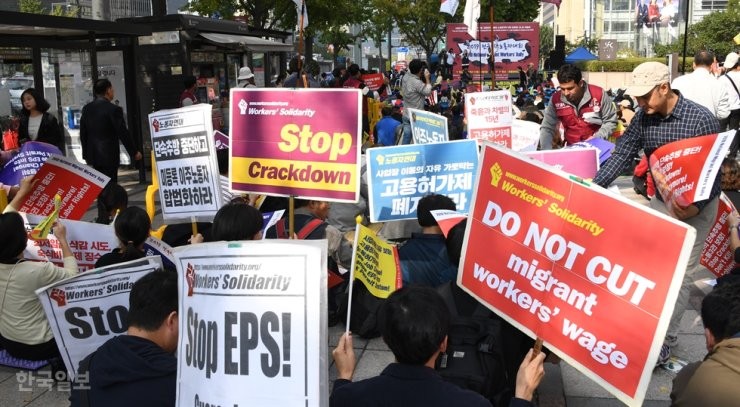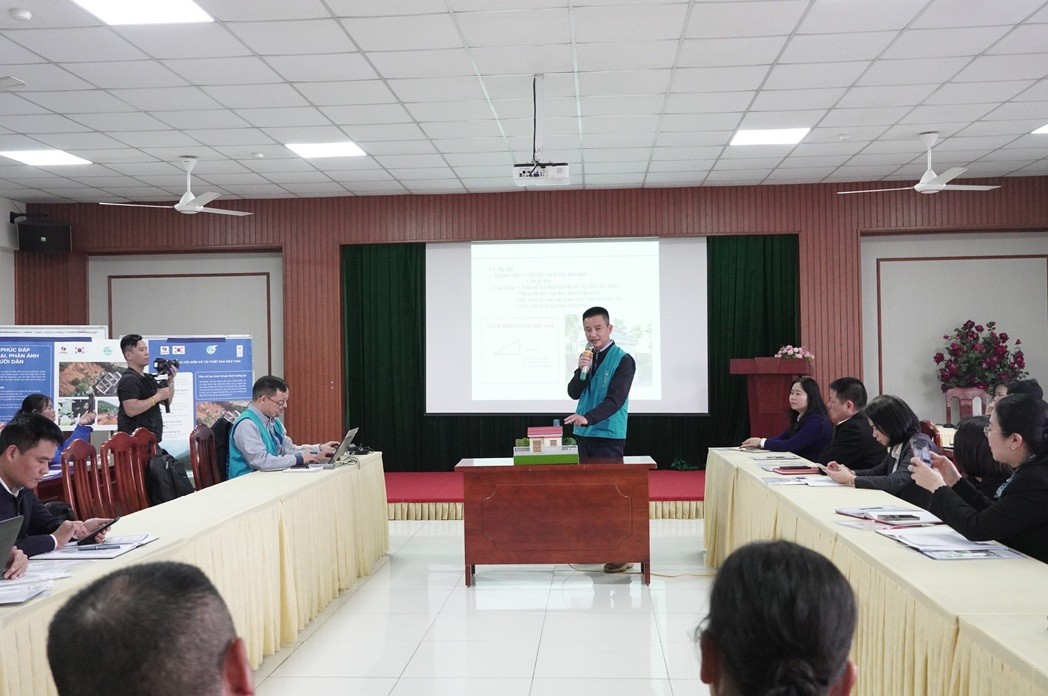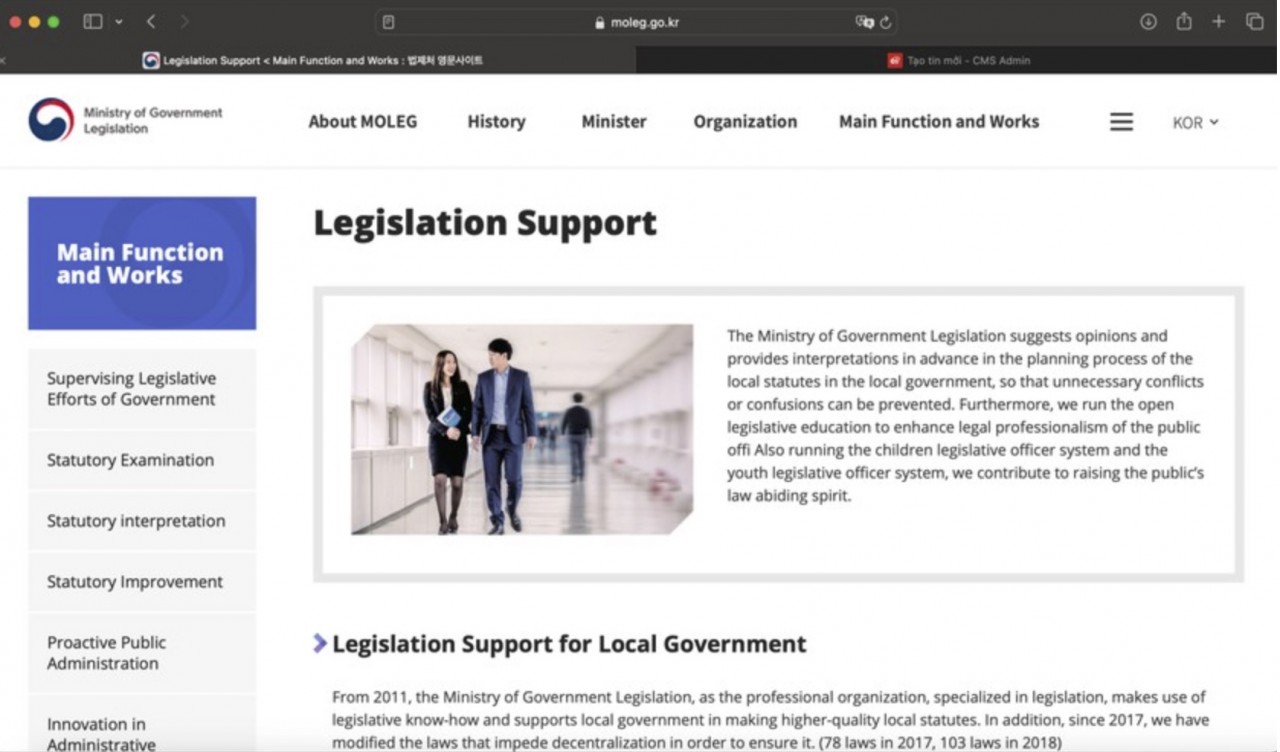One in 4 migrant workers in RoK’s Gwangju struggling with unpaid wages: Korea Times
| Measures to protect foreign brides from domestic violence: Korea Times | |
| A warning for Vietnamese illegal migrant workers | |
| US suspends entry of immigrants who cannot pay for healthcare |
 |
| Nearly 25 percent of 369 migrant workers from 12 countries said they are struggling to get unpaid wages. Korea Times file |
According to a survey conducted by the city government between March and October, 24.7 percent of 369 workers from 12 countries said they are struggling to get unpaid wages from current or former employers while working in the RoK.
The rate is higher among illegal aliens (33.3 percent) than those with visas (23.8 percent).
Asked how they responded to the problem, 68.2 percent said they changed jobs, while 31.8 percent said they did nothing.
A total of 54.5 percent said they have experienced some form of mental or physical abuse, mostly from their employers or Korean colleagues. Male workers (56.8 percent) are more likely to experience abuse than females (48 percent).
According to the Korea Employment Information Service, the number of migrant workers in South Jeolla Province, including the city, is about 14,000.
Factory owners are their biggest employers, with 8,400 people working in the manufacturing sector, followed by agriculture and livestock (2,290), fishing (2,986), construction (693) and service (104) industries.
The RoK is Vietnam’s second largest labour importer and Vietnam is the second largest labour exporter of the RoK. Currently, more than 48,000 Vietnamese guest workers are working in the RoK.
According to The Korea Times, design failures in the government-run Employment Permit System, which assigns legal visas for heavy manual work in Korea for up to four years and 10 months, also contribute to the increasing number of undocumented workers. Previous E-9 visa holders account for around 12 percent of the undocumented workforce. Because the system does not allow workers free change of workplace, rights groups say many are forced to go off the grid to escape abusive employers.
The RoK’s government's plan to extend visa waiver policies to tourists from Vietnam, the Philippines and Indonesia is raising concerns about a possible influx of undocumented immigrants.
The plan ― extending the five-day mainland visa waiver to group tourists from the three Southeast Asian countries whose final destination is Jeju Island ― was unveiled on Dec.12, at a national tourism strategy meeting presided over by Prime Minister Lee Nak-yon in Cheongju, North Chungcheong Province, to help bring 20 million tourists to the country in 2020.
However, not everyone is optimistic about the changes.
"The government leaves in place institutions and policies that lead to a proliferation in unregistered immigrants, focusing only on crackdowns to manage the numbers," said Seok Won-jeong, a Joint Committee with Migrants in Korea (JCMK) member who criticized immigration policies and the restrictive employment permit system in a Hankyoreh article in May.
People from Vietnam, the Philippines and Indonesia are among the top eight nationalities found in the undocumented foreign workforce, which numbered 380,081 in September according to the immigration office. Forty-five percent of undocumented workers entered Korea via visa waiver programs.
The concerns come after 164 Vietnamese students disappeared from a one-year foreign student program at Incheon National University's Korean Language Institute last week. Immigration officials suspect they vanished to seek illegal employment here.
However, according to Minh Quan, a 20-year-old Vietnamese student studying in the RoK for two years, as a rule, students on D4-1 visas can only work part-time 20-28 hours a week. If there are no scholarship or families' support, Vietnamese students cannot afford the Korean language training program's tuition and living expenses.
Quan explained, the hourly wage is about USD 6. If working “legally”, he earns USD 558 - 644/month. Meanwhile, Quan must spend USD 214-257 on tuition of Korean language class, USD 429 on living expense. He claimed that it was the "moderate" level because for those who like shopping, the monthly living expenses reach USD 859.
To solve the problem, international students often choose to work overtime. Students and business-owners break the rule by making a contract lying about working hours. Every month, the contractual salary is transferred to a bank account registered with the Korean government. For the overtime pay, students receive cash or the boss will transfer to a different bank account.
Currently, Quan’s total income is USD 1203. USD 773 is transferred to the bank and USD 430 is cash. Quan explained, Korean employers “cooperate” with student to break the rule due to the high demand for labor, especially young laborers for heavy manual work./.
Recommended
 World
World
Pakistan NCRC report explores emerging child rights issues
 World
World
"India has right to defend herself against terror," says German Foreign Minister, endorses Op Sindoor
 World
World
‘We stand with India’: Japan, UAE back New Delhi over its global outreach against terror
 World
World
'Action Was Entirely Justifiable': Former US NSA John Bolton Backs India's Right After Pahalgam Attack
 World
World
US, China Conclude Trade Talks with Positive Outcome
 World
World
Nifty, Sensex jumped more than 2% in opening as India-Pakistan tensions ease
 World
World
Easing of US-China Tariffs: Markets React Positively, Experts Remain Cautious
 World
World





